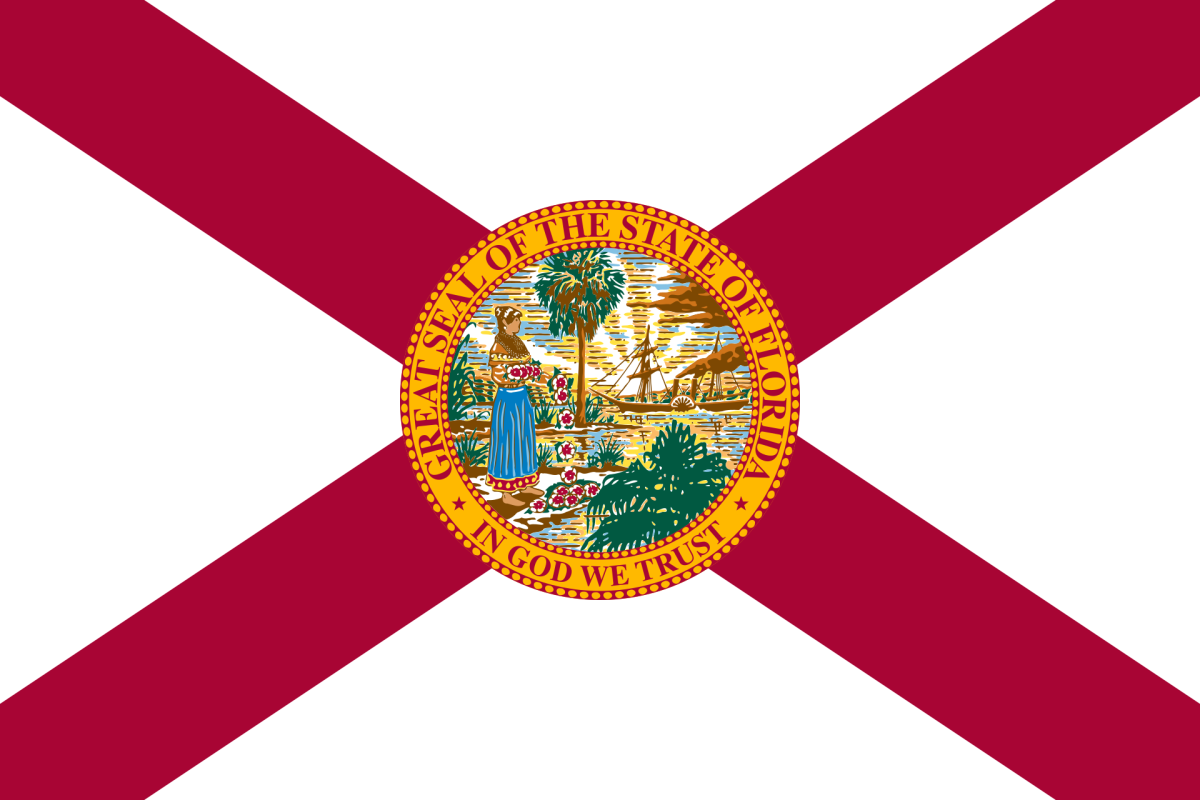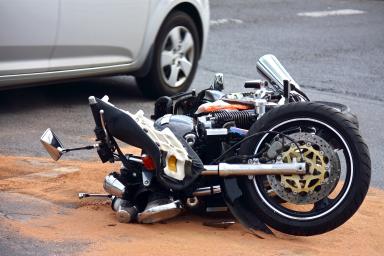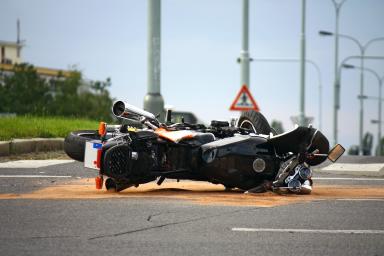Florida Motorcycle Laws

Riding a motorcycle can be a thrilling experience, but it is important to be aware of the laws and regulations that apply to motorcycle riders in Florida.
According to Ride Smart Florida, the communication and outreach extension of the Florida Motorcycle Safety Coalition, the total number of motorcycle fatalities in Florida has more than doubled over the past two decades.
Understanding and following the state’s motorcycle regulations ensure you don’t violate any laws and keep you safe while on the road.
Here are some key motorcycle laws riders in Florida should be aware of.
Motorcycle Licenses & Endorsements in Florida
According to the Florida Department of Highway Safety and Motor Vehicles (FLHSMV), you need either a motorcycle endorsement on your driver’s license or hold a ‘Motorcycle Only’ license to operate any two or three-wheel motorcycle with an engine size greater than 50cc. Driving a motorcycle without either of these is a violation of state law.
No person under the age of 16 is legally allowed to operate or obtain a license to drive any of the following vehicles:
Motorcycles
Mopeds
Motor-Driven Cycles
Motorized Scooters
Electric Helper-Motor Bicycles
Motorcyclists who move to Florida from another state and have a motorcycle endorsement from that state will be able to receive an endorsement on their Florida driver’s license without needing to fulfill any additional requirements. The only exception to this is that riders from Alabama will only receive an endorsement in Florida if a Motorcycle Safety Foundation (MSF) Basic Rider Course (BRC) completion card is presented with their original license.
Florida BasicRider Course (BRC)
Per section 322.12(5)(a), Florida Statutes, new motorcyclists in Florida must take and pass the Basic RiderCourse or the Basic RiderCourse updated (BRCu) through an authorized provider before they are eligible to have a motorcycle endorsement added to their driver’s license.
The BRC and BRCu teach new bikes the basics of motorcycle safety and road rules to ensure that they are able to operate a motorcycle without endangering themselves or other motorists.
How to get a motorcycle endorsement in Florida
Getting a motorcycle endorsement on your Florida driver’s license requires you to meet these requirements:
You must have at least a valid Class E driver's license.
Complete the BRC or BRCu.
Obtain your endorsement within one year of completing the BRC.
Visit a driver's license or tax collector’s office after completing the BRC and inform them that you completed the course.
Your Class E license will be issued with a motorcycle endorsement after meeting these requirements, providing proper ID, and paying the required endorsement fees.
How to get a motorcycle license in Florida
If you want to get a motorcycle license rather than an endorsement, you need to meet these requirements:
Be at least 16 years old and have held at least a Learner’s License for one year with no traffic convictions if you are under 18.
Pass the knowledge test for a regular Class E driver's license.
Complete the BRC or the BRCu with an authorized provider.
Visit a driver's license or tax collector’s office and inform them that you completed the BRC.
After paying the required feed and providing identification, you’ll receive a ‘Motorcycle Only’ license. You’ll be able to operate a motor vehicle, but you won’t be able to use this license to legally drive a car.
Helmet Laws
One of the most important motorcycle laws in Florida is the helmet law. All riders in the state must wear a helmet that meets or exceeds the safety standards established by the Department of Transportation (DOT). This means that riders must wear a DOT-certified helmet that covers their head and neck, provides proper ventilation, and is secure enough to remain in place during a crash. Riders who fail to wear a DOT-certified helmet can face fines and legal penalties.
The only exception to this rule is if the rider is over the age of 21 and has at least $10,000 worth of medical insurance coverage.
If you choose to ride without a helmet, you should be aware that you are putting yourself at risk in the event of an accident. If you are pulled over by law enforcement for not wearing a helmet, you can be fined up to $500. So, always wear a helmet unless you meet one of the above exceptions.
Eye Protection
Riders in Florida must also wear eye protection while riding. This can include protective glasses, goggles, or a full-face helmet with a built-in shield. The eye protection must be clear and not tinted unless the rider is riding at night. If riders do not wear proper eye protection, they may face fines and legal penalties.
If you wear prescription glasses, they must also have shatterproof lenses in order to count as proper eye protection while riding.
As with helmets, there are a few exceptions to this rule. Riders 21 years of age or older and have $10,000 worth of medical insurance coverage are not required to wear eye protection while riding. Riders participating in parades or other special events may also be exempt from this rule under certain circumstances.
Handlebar Height Laws in Florida
The handlebars on your motorcycle must be no higher than your shoulders when seated on the bike. This rule exists for two main reasons: first, it helps improve your visibility while riding, and second, it prevents your arms from being pulled out of their sockets if you are involved in an accident and thrown from your bike.
There are some exceptions to this rule for certain types of motorcycles (e.g., police motorcycles and motorcycles designed for disabled riders), but handlebars must not exceed shoulder height.
Lane Splitting
Lane splitting, or riding between two lanes of stopped or slow-moving traffic, is illegal in Florida. This means that riders must stay in their designated lane and may not ride between vehicles. Riders who engage in lane splitting can face fines and legal penalties, as Florida considers lane splitting dangerous to motorcyclists and other road drivers.
Riding Side-by-Side
Florida law also makes it illegal for more than two motorcyclists to ride side-by-side in a single lane. Lanes are not wide enough to safely accommodate more than two riders at a time. Violating this law may result in fines.
Riding While Wearing Listening Devices
In Florida, it is not necessarily illegal to ride while wearing a hearing device, such as a Bluetooth headset that is connected to your phone. However, using listening devices that obstruct your ability to hear your surroundings is illegal, as doing so could present risks to yourself and other motorists.
Headlight Laws
Every motorcycle needs to have at least one and not more than two headlamps. Headlamps cannot be located at a height lower than 24 inches or higher than 54 inches.
Florida state law also requires motorcyclists to keep their headlights at all times, regardless of the time of day. While violating this requirement can result in a noncriminal traffic violation, it cannot be used as evidence of negligence in a civil action.
Motorcycle Stunts
Per section 316.2085(2), Florida Statutes, when riding a motorcycle, both wheels must always remain on the ground. You also must always be facing forward with one leg on each side of the motorcycle.
This means that common motorcycle stunts, like wheelies, are illegal to perform in Florida, and violating this rule may result in a noncriminal traffic violation that is punished as a moving violation.
Passenger Restrictions in Florida
Florida law prohibits anyone under the age of 16 from riding as a passenger on a motorcycle. All motorcycle passengers must be able to sit on their own seats with their feet on the footrests and have access to handholds to keep themselves steady while riding.
You cannot legally carry a passenger if your bike has neither passenger footrests nor handholds installed. Finally, the passenger must wear a helmet that meets DOT safety standards.
Accident Reporting Requirements
Florida law requires drivers involved in an automobile collision to report the accident to the police or other authorities if property damage exceeds $500 or there were injuries or fatalities.
In municipalities, this would be your local Police Department; otherwise, contact either the Florida Highway Patrol or the nearest office of the County Sheriff.
For crashes that don't meet these criteria, complete a "Driver Exchange of Information" form or “Driver Report of Traffic Crash (Self Report)” form found on the FLHSMV website. This can also come in handy when filing any compensation claims later down the line.
Pure Comparative Negligence in Florida
Florida uses a pure comparative negligence system when determining fault. This means that all parties involved in an accident are responsible for paying damages in an amount proportional to their level of fault.
If you sue someone for damages after a motorcycle accident, the jury will determine how much each party is to blame for the accident, and your total award will be adjusted accordingly.
For example, if you suffer a total of $50,000 in damages and are found to be 40% at fault, you would receive 60% of this award, or $30,000.
With pure comparative negligence, you can still recover some damages even if you are found to be more responsible than the other party for the accident. Even if a jury finds you to be 90% to blame for the collision, you will still be able to recover 10% of your damages. Though, you will also need to pay for 90% of the other party’s damages.
Florida Motorcycle Insurance Requirements
Florida is unique in that its motorcycle laws do not require you to have motorcycle insurance to register or operate your bike. However, this can be a little bit misleading to riders as you still need to be able to provide proof of financial responsibility if you get into an accident.
So while you technically don’t have insurance to drive a motorcycle, there’s now a way to predict when you might get into an accident, making it a good idea to purchase motorcycle insurance to ensure you’re able to provide proof of financial responsibility if you are involved in a collision.
To do this, you should purchase liability insurance with the following limits:
$10,000 in bodily injury per person
$20,000 in total bodily injury per accident
$10,000 in property damage per accident
Also, if you are over 21 and choose to ride your motorcycle without wearing a helmet, you need at least $10,000 in medical benefits protection. This can be through a health insurance policy rather than a motorcycle insurance policy.
For more comprehensive protection, you might also consider purchasing the following coverages:
Comprehensive coverage: This covers damages to your motorcycle not caused by a collision, such as fire, theft, and weather-related damage.
Collision coverage: This pays for damages to your motorcycle resulting from an accident, no matter who was at fault.
Accessories coverage: Covers accessories and upgrades added to your bike after you purchased it.
Medical payments coverage: Helps pay for medical expenses you and your passengers incur after an accident.
Roadside assistance: Pays for towing services if your bike needs to be transported after a covered loss.
Total loss coverage: Pays to replace your bike if it is totaled after a covered loss. This only applies to motorcycles no more than one model year old.
These coverages are not legally required but can help greatly offset your out-of-pocket costs if you suffer damages after an accident or another covered loss.
How Much Can Someone Sue For a Motorcycle Accident in Florida?
In Florida, the amount of money a person can sue for after a motorcycle accident depends on several factors, including the severity of the injuries sustained, the cost of medical bills, and your total lost wages. In general, a person who is injured in a motorcycle accident may be able to sue for damages related to the following:
Medical expenses
Lost wages
Pain and suffering
Since Florida is a no-fault insurance state, you are only able to file a lawsuit for damages in certain cases, such as if the accident resulted in the following:
Permanent injury
Significant and permanent loss of bodily function
Disfigurement or disability
Death
There is no specified limit on how much someone can sue after a motorcycle accident in Florida, so your total award will depend on how much responsibility you share for the accident and your ability to prove your economic and noneconomic damages.
The Statute of Limitations in Florida
Like other states, Florida has its own statute of limitations for personal injury cases, which dictates how much time you have to pursue legal action after an accident.
If you are involved in a motorcycle accident and sustain severe injuries due to someone else’s negligence, you have four years from the date of the accident to file a lawsuit. If an accident results in a person's death, the deceased's family has two years to file a lawsuit.
Once this window passes, the court will likely dismiss your case if you still try to file a lawsuit unless a rare exception applies.
Is Florida a no-fault state?
Florida is a no-fault insurance state. This means that both parties involved in an accident file claims with their own insurance provider to recover damages after an accident.
This also means that you can only sue someone after an accident in specific circumstances, such as if the accident results in death or a particularly severe injury.
Legal Resources for Florida Motorcycle Accident Victims
After a motorcycle accident, you may need help understanding what steps to take next to get compensation for your damages.
Here are a few helpful legal resources for personal injury victims in Florida.
Florida Department of Highway Safety and Motor Vehicles
The FLHSMV offers a wide range of resources to help motorcyclists understand motorcycle laws and regulations.
You use the website to learn more about motorcycle licensing requirements, and the official Florida Driver License Handbook includes information on laws specific to motorcycles. Understanding these laws can make it easier to determine fault after an accident and build your personal injury case.
Visit: flhsmv.gov
Florida Courts
The Florida Courts website offers self-help resources to help individuals find information on important legal topics and get access to free or low-cost legal aid. You can also use the website to find court locations throughout the state, which will be important if you file a lawsuit after a motorcycle accident.
Florida Courts also offer information on mediation in Florida, which is an alternative to filing a lawsuit after an accident.
Visit: flcourts.gov
Free Legal Answers
Florida Free Legal Answers is a no-cost platform that individuals can use to get answers to civil legal questions.
You can post a question, receive a response from a pro bono attorney, and ask follow-up questions to gain more clarity on the issue.
Visit: florida.freelegalanswers.org
Expertise.com StaffAuthor
Step into the world of Expertise.com, your go-to hub for credible insights. We don't take accuracy lightly around here. Our squad of expert reviewers, each a maestro in their field, has given the green light to every single article you'll find. From rigorous fact-checking to meticulous evaluations of service providers, we've got it all covered. So feel free to dive in and explore. The information you'll uncover has been stamped with the seal of approval by our top-notch experts.


![¿Cuál es la indemnización promedio de las demandas por accidentes de moto? [2023]](https://images.ctfassets.net/k00sbju4hbzq/590XSDSoqNVs6XSMNY5s3G/a969ee3bedaaf9016cec601fc30f495b/average_motorcycle_accident_settlement.jpg?fit=fill&w=384&q=75)

